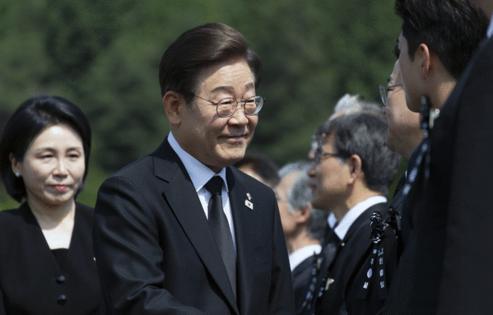Commentary: South Korea's new president tries to shake up the Korean Peninsula
Published in Op Eds
As the world rightly remains focused on the bloody battlefields of Ukraine and the humanitarian abomination that is Gaza, South Korea’s new president is trying to shake up the status quo on the Korean Peninsula, one of the most militarized regions on the planet. Whether he succeeds will depend on North Korean leader Kim Jong Un’s willingness to cooperate and the Trump administration’s support of the endeavor.
Lee Jae Myung, a former factory worker and opposition politician elected in June, came into office promising big things. His campaign, which came at a time when recently impeached President Yoon Suk Yeol was facing charges of instigating a coup, focused on getting South Korea back in order.
The country, one of Asia’s leading democracies, is still recuperating from months of political turmoil and constitutional crisis after a short-lived usurpation of power by Yoon fizzled courtesy of South Korean troops who held their fire and civilians who came out to protest.
Lee ran a campaign centered primarily on competence with a simple but compelling message: He’ll fix what his predecessor broke. This included changes to South Korea’s foreign policy as well, which Lee argued was far too hawkish and ideological under Yoon.
He wasn’t wrong; Yoon’s presidency, for instance, was a disaster for inter-Korean relations. The disgraced president’s North Korea policy leaned on the stick to the total exclusion of the carrot, with communication channels between South and North Korean officials falling apart and the one big security agreement the two adversaries signed in 2018 dying on the table. North Korea’s Kim shares the blame too, but there’s no question that Yoon’s hard-line policies pushed Pyongyang into a corner.
Bringing stability back to the Korean Peninsula is a tall order for any South Korean president sitting in the Blue House. Yet for Lee, it’s a necessity if the goal is to prevent a further degradation of the situation.
It didn’t take long for Lee to start putting out feelers to the Kim regime. In contrast to Yoon, who was a fan of preconditions and wouldn’t dream of handing the North Koreans anything that could be seen as a concession, the new administration in Seoul is doing what it can unilaterally to improve the odds of detente.
On June 12, for example, Lee ordered a stoppage to the propaganda broadcasts that South Korea beams into the North from loudspeakers close to the Demilitarized Zone. The anti-Kim leaflets that defectors and activists often send into the North, which drives the Kim regime crazy, are now viewed by the authorities in Seoul as akin to a hostile act whose rewards aren’t worth the trouble.
The radio broadcasts that provide the North Korean population with access to legitimate news outside the Kim regime’s control have declined by roughly 80%, a decision purportedly executed by South Korea’s spy agency. The South Koreans are talking about resuming individual tours to the North as well, which haven’t occurred since 2008. And the man in charge of Seoul’s inter-Korean file is scheduled to make a stop at the Panmunjom peace village in the inter-Korean border region.
Lee’s signal to North Korea is easy to grasp: The two nations need a relationship that’s on a more solid footing, and he is doing what he can to move it in that direction.
Of course, there’s only so much the South Korean president can do on his own. After all, it takes two to tango. If the North Koreans don’t reciprocate, then Lee’s initiative will likely cause him a world of hurt politically as conservative politicians lambaste his administration for being weak on a key foreign policy issue.
Unfortunately, at this stage, the Kim regime isn’t buying what Lee is selling. Kim Yo Jong, Kim Jong Un’s powerful sister who often serves as Pyongyang’s spokesperson on critical matters, all but laughed at what the South Koreans are doing. Despite Seoul’s “sincere efforts,” she said, Lee is in reality no different than the other people who came before him.
“We clarify once again the official stand that no matter what policy is adopted and whatever proposal is made in Seoul, we have no interest in it and there is neither a reason to meet nor an issue to be discussed,” Kim Yo Jong remarked.
What to make of North Korea’s refusal to play ball? Some of this can be chalked up to the typical bluster we often hear from North Korean officials, where threats to envelop the South Korean capital in a sea of fire are never far away. Another explanation is that Kim Jong Un doesn’t need to do much of anything right now to elicit concessions from the South Koreans — so why give up something when you can get it for free?
But I suspect the bigger factor driving Pyongyang’s intransigence is strategic. North Korea is far less interested in reconciling with Seoul, let alone Washington, this year than it was during Trump’s first term. The global landscape between then and now is light years apart. Back then, the Kim regime was dealing with a stringent United Nations Security Council sanctions regime that limited the North’s ability to import and export key goods. Now, while the sanctions regime is still in effect, enforcement is a joke thanks to Russian and Chinese violations.
Back then, Pyongyang was relatively isolated; today, it’s enjoying a strategic relationship with Moscow that has paid off handsomely for the Kim family.
The hard thing about international relations is all the puzzle pieces have to fit for dramatic change to happen. On the Korean Peninsula, however, the puzzle pieces are still all over the table.
_____
Daniel DePetris is a fellow at Defense Priorities and a foreign affairs columnist for the Chicago Tribune.
_____
©2025 Chicago Tribune. Visit at chicagotribune.com. Distributed by Tribune Content Agency, LLC.

























































Comments